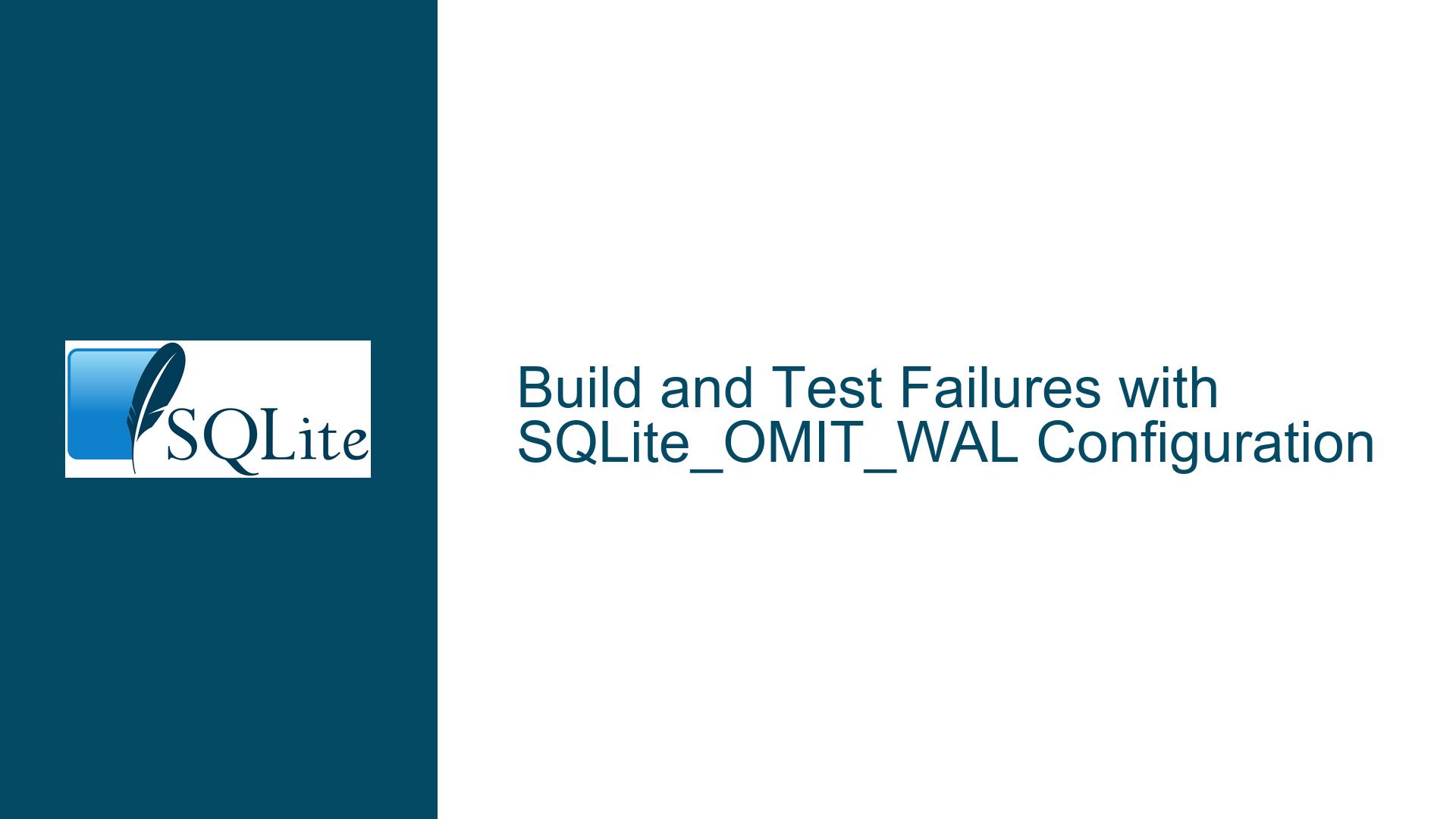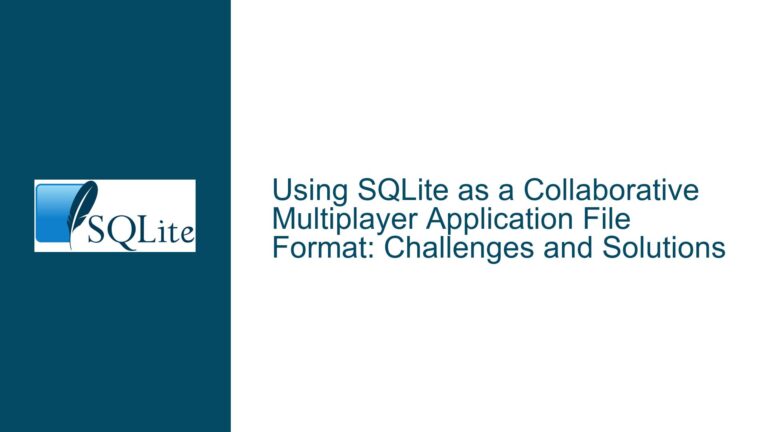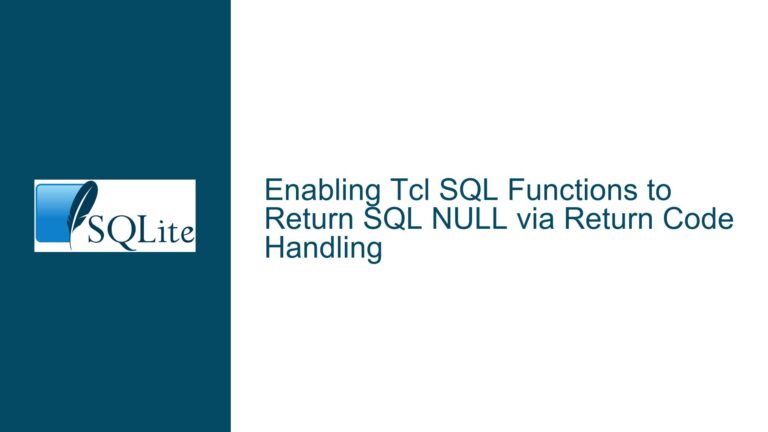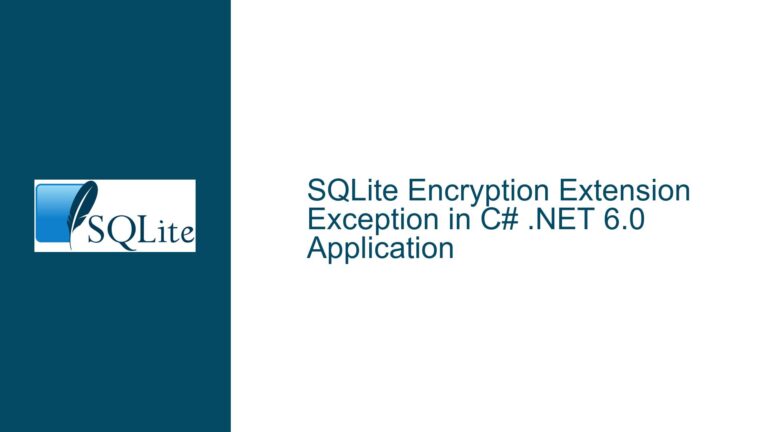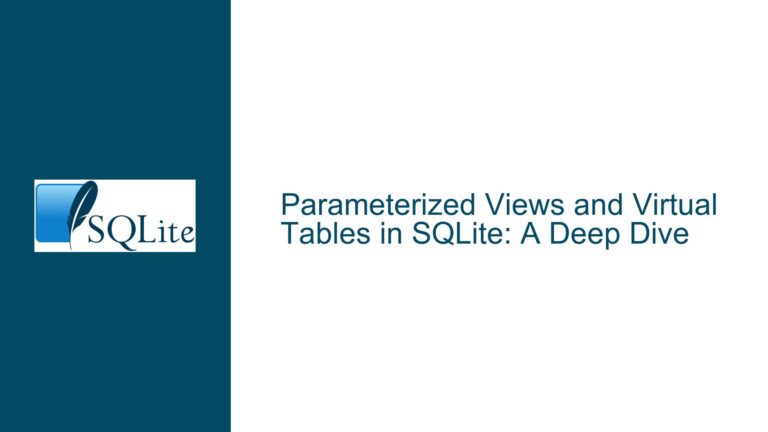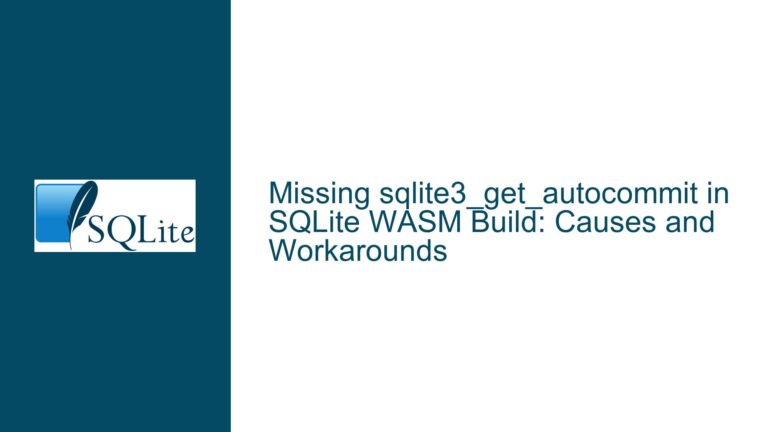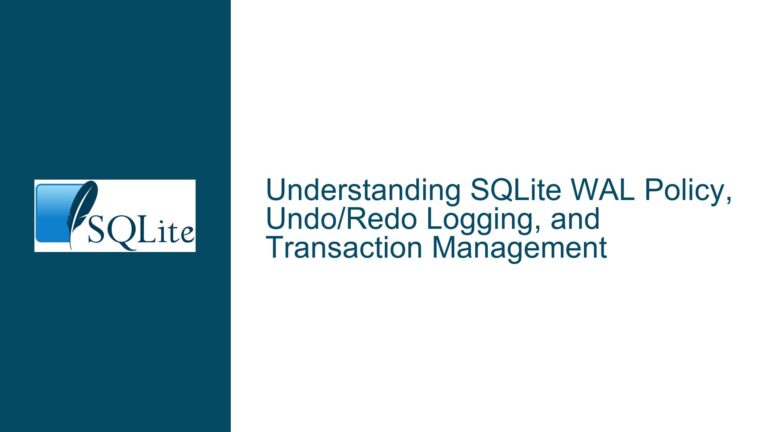Build and Test Failures with SQLite_OMIT_WAL Configuration
Build Failures and Test Issues in SQLite_OMIT_WAL Mode
When configuring SQLite with the -DSQLITE_OMIT_WAL flag, which disables the Write-Ahead Logging (WAL) feature, several build and test failures can occur. These issues stem from the fact that certain parts of the SQLite codebase and its test suite assume the presence of WAL functionality. The primary problems manifest in two areas: build-time errors due to missing WAL-specific code and test failures because many tests are designed to run with WAL enabled. Additionally, there are inconsistencies in how the default VFS (Virtual File System) is handled across different platforms, particularly when custom VFS implementations are used.
The build failure in os_unix.c is a direct result of the unixFileControl function referencing unixFcntlExternalReader, which is not defined when WAL is omitted. This creates a compilation error because the code assumes WAL is always available. On the testing side, numerous tests fail because they rely on WAL-specific behavior, such as WAL checkpointing, WAL auto-mode, and WAL hooks. These tests include busy2-1, busy2-2, chunksize-2, corruptL-14.2, and many others. Furthermore, the oserror test appears to have platform-specific assumptions that do not account for custom VFS implementations running on Unix-like systems.
Unconditional WAL Dependencies and Platform Assumptions
The root cause of these issues lies in the unconditional dependencies on WAL functionality within the SQLite codebase and test suite. When -DSQLITE_OMIT_WAL is defined, the codebase does not adequately exclude or conditionally compile WAL-specific code paths, leading to build failures. For example, the unixFileControl function in os_unix.c references unixFcntlExternalReader, which is only defined when WAL is enabled. This creates a compilation error because the function is not available in WAL-less configurations.
Similarly, the test suite contains numerous tests that assume WAL is always available. These tests are designed to validate WAL-specific behavior, such as checkpointing, auto-mode transitions, and WAL hooks. When WAL is omitted, these tests fail because the underlying functionality they rely on is absent. Additionally, the oserror test makes platform-specific assumptions that do not account for custom VFS implementations running on Unix-like systems. This leads to incorrect behavior when the default VFS is overridden but the platform remains Unix-like.
Resolving Build and Test Failures in WAL-less Configurations
To address these issues, several steps can be taken to ensure that SQLite builds and tests correctly in WAL-less configurations. First, the codebase must be modified to conditionally compile WAL-specific code paths. For example, the unixFileControl function in os_unix.c should only reference unixFcntlExternalReader when WAL is enabled. This can be achieved using preprocessor directives to exclude WAL-specific code when -DSQLITE_OMIT_WAL is defined.
Second, the test suite must be updated to account for WAL-less configurations. Tests that rely on WAL functionality should be conditionally excluded or modified to work without WAL. For example, the busy2-1, busy2-2, and chunksize-2 tests can be modified to use rollback journal mode instead of WAL. Similarly, the oserror test should be updated to check for the default VFS rather than assuming the platform is Unix-like.
Finally, developers working with custom VFS implementations should ensure that their configurations are compatible with WAL-less builds. This includes verifying that all necessary functions are defined and that platform-specific assumptions are correctly handled. By following these steps, it is possible to build and test SQLite in WAL-less configurations without encountering the issues described above.
Detailed Modifications for Conditional Compilation
To resolve the build failure in os_unix.c, the unixFileControl function must be modified to conditionally reference unixFcntlExternalReader. This can be achieved using preprocessor directives as shown below:
#ifndef SQLITE_OMIT_WAL
if( op==SQLITE_FCNTL_EXTERNAL_READER ){
return unixFcntlExternalReader(pFile, pArg);
}
#endif
This change ensures that the unixFcntlExternalReader function is only referenced when WAL is enabled, preventing compilation errors in WAL-less configurations.
Updating the Test Suite for WAL-less Configurations
The test suite must be updated to account for WAL-less configurations. This involves modifying or excluding tests that rely on WAL functionality. For example, the busy2-1 and busy2-2 tests can be modified to use rollback journal mode instead of WAL. This can be achieved by setting the journal mode explicitly at the beginning of the test:
db eval {PRAGMA journal_mode=DELETE;}
Similarly, the oserror test should be updated to check for the default VFS rather than assuming the platform is Unix-like. This can be done by modifying the test condition as follows:
if {[test_syscall defaultvfs] != "unix"} {
# Test logic for non-Unix VFS
} else {
# Test logic for Unix VFS
}
Handling Custom VFS Implementations
Developers working with custom VFS implementations should ensure that their configurations are compatible with WAL-less builds. This includes verifying that all necessary functions are defined and that platform-specific assumptions are correctly handled. For example, if a custom VFS implementation overrides the default VFS on a Unix-like system, the oserror test should be updated to account for this scenario.
By following these steps, it is possible to build and test SQLite in WAL-less configurations without encountering the issues described above. This ensures that SQLite remains a robust and flexible database solution for a wide range of use cases, including those that do not require WAL functionality.
